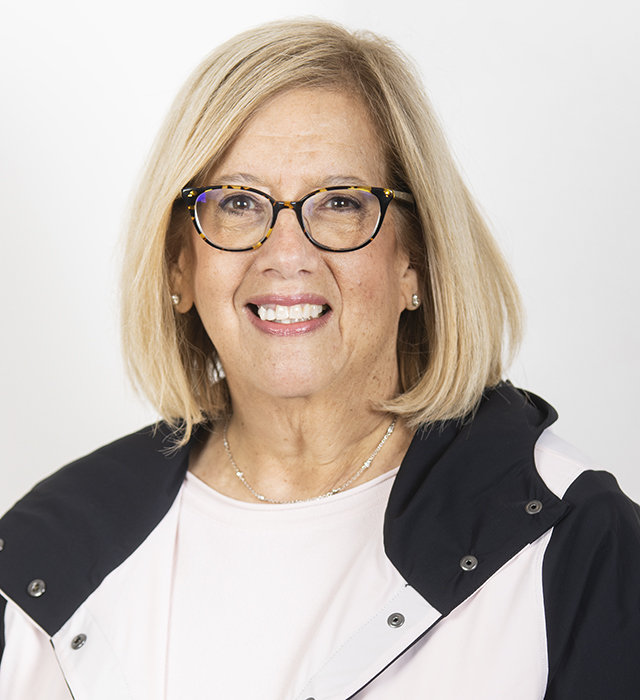From a young age, M² Board Member Deb Friedman was fortunate to meet a number of influential educators who recognized her passion for learning and took the time to guide her on her journey.
“I always wanted to learn, but I didn’t grow up with a very formal Jewish education,” said Friedman. “I was 16 when I first learned to read Hebrew because an educator at United Synagogue Youth (USY) sat down with me and said, ‘Do you want to learn? I want to teach you.’”
USY, the Conservative youth movement, changed her life, setting her on a path as a Jewish professional, including serving as Executive Director of the Solomon Schechter Day School of Nassau County and SAJES on Long Island, as well as the Chief Officer for Institutional Advancement at The Jewish Education Project. She also met her husband at a USY event.
Not only did Jewish educators inspire Friedman’s professional journey, but they are also a big reason why Friedman was able to mark a number of important Jewish milestones including becoming a Bat Mitzvah at age 26 and chanting Torah for the first time at her granddaughter’s Bat Mitzvah recently.
“Throughout my life, there were educators who recognized that I had a need,” said Friedman. “They stepped out and said, ‘I will make time for you. Let’s work together.’”
For Friedman, joining M²‘s board is a way of paying that forward, of supporting the next generation of educators with the tools and development they need to succeed so that others will have the same positive experiences.
The Jewish community needs to cultivate the kind of leaders who can recognize when someone has the drive or desire to learn something new and to step out of their regular path in order to meet them where they are, Friedman believes. “We need Jewish educators who can recognize that they can blend their knowledge with everyday lives,” said Friedman. “They need to understand that education is not cookie cutter — and, whenever possible, to take an individualized approach to each person.”
Supporting educators, developing leaders
Cultivating those kinds of leaders, like the ones that had such an impact on Friedman, also requires supporting the development of a wide variety of Jewish educators. Educators in both formal and informal frameworks need to be equipped with the right tools, as well as the time, space, and confidence, to meet people where they are, especially outside the classroom.
Friedman joined the M² board because she was excited about the innovative approaches to helping Jewish professionals who are involved in experiential education learn new perspectives and strategies.
In the past, many overlooked the value of experiential education, dismissing it as just fun and games. Friedman appreciates that M² has professionalized experiential education and found ways to drive funding into innovative initiatives.
“Previously, there was a misconception that you can really only learn in school,” said Friedman. “But M² has helped people see that other types of Jewish education really impact people.”
Friedman is also committed to advocating for Jewish educators to receive fair wages, benefits, and professional development. “We want people to know they can fulfill their dreams as Jewish educators while living good lives,” she said.
Strengthening all types of Jewish initiatives
Friedman believes that M²’s non-denominational approach to supporting experiential education frameworks is critical. As membership at traditional Jewish frameworks like synagogues and day schools is challenged, the Jewish community needs to adapt by offering alternative ways to approach learners.
“We need to recognize that there are so many places where Jewish educators can build community and educational opportunities,” she said.
When educators, including those working in experiential education, feel that their work is recognized and supported by the community, it gives them the confidence to launch new initiatives that will shake up staid approaches to Jewish community involvement, Friedman explained. And more importantly, it gives those educators space to guide learners’ journeys, just as they did for Friedman.
“We need to help educators grow, whether it’s with professional development, mentoring, or whatever else they need,” said Friedman. “When you see that spark, you have to do whatever you can to bring it out.”
Deborah (Deb) Friedman has focused her career on strengthening the infrastructure of Jewish organizations for growth and sustainability. Deb was a senior executive for 25 years, most recently at The Jewish Education Project, where she was instrumental in leading the merger of two legacy organizations. Her work focused on organizational advancement in areas including brand redesign, communications, and fundraising/development. Deb has found great satisfaction in board and volunteer development: recruiting and leveraging the skills of volunteers to find the balance that benefits the board member and organization. Deb understands the nuances of developing and running a successful not-for-profit. She previously served as Executive Director of the Solomon Schechter Day School of Nassau County and SAJES on Long Island. She attended Long Island University and NYU. Her varied volunteer work has included local and national organizations, consulting on merger opportunities for other Jewish agencies and synagogues, and as a Board Member at Jewish For Good (formerly known as Jewish Federation of Durham-Chapel Hill). Throughout her career, Deb embraced every opportunity to encourage and support young adults considering or working in Jewish education and communal service. Deb and her husband reside in North Carolina and Florida.
